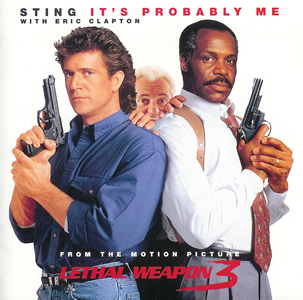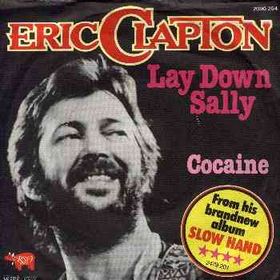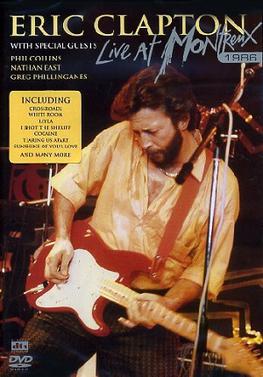
August is the tenth solo studio album by Eric Clapton, released in 1986 by Duck Records/Warner Bros. Records. Described as a "hard R&B" album, it was primarily produced by Phil Collins, in association with longtime Clapton associate Tom Dowd.

"Layla" is a song written by Eric Clapton and Jim Gordon, originally recorded with their band Derek and the Dominos, as the thirteenth track from their only studio album, Layla and Other Assorted Love Songs (1970). Its contrasting movements were composed separately by Clapton and Gordon. The piano part has also been controversially credited to Rita Coolidge, Gordon's girlfriend at the time.

Unplugged is a 1992 live album by Eric Clapton, recorded at Bray Studios, England in front of an audience for the MTV Unplugged television series. It includes a version of the successful 1992 single "Tears in Heaven" and an acoustic version of "Layla". The album itself won three Grammy awards at the 35th Annual Grammy Awards in 1993 and became the bestselling live album of all time, and Clapton's bestselling album, selling 26 million copies worldwide.

"Tears in Heaven" is a song by English guitarist, singer, and songwriter Eric Clapton and Will Jennings, written about the death of Clapton's four-year-old son, Conor. It appeared on the 1991 Rush film soundtrack. In January 1992, Clapton performed the song in front of an audience at Bray Studios, Berkshire, England for MTV Unplugged, with the recording appearing on his Unplugged album.

Clapton Chronicles: The Best of Eric Clapton is a compilation album by English guitarist Eric Clapton featuring his hits from the 1980s and 1990s. The album was released on 12 October 1999 by the Duck / Reprise Records label. Two new songs are included on the disc, "Blue Eyes Blue" which was previously released as a single and "(I) Get Lost" which Clapton wrote for the soundtrack to the film The Story of Us.

Crossroads is a 1988 music collection box set of the work of Eric Clapton released by Polydor Records. The set includes his work with the Yardbirds, John Mayall & the Bluesbreakers, Cream, Blind Faith, Delaney & Bonnie & Friends and Derek and the Dominos, as well as his solo career.

"After Midnight" is a rock song by J. J. Cale, first released in 1966. Eric Clapton later covered it for his eponymous album, released in 1970. Clapton's rendition became a success, prompting Cale to re-record the song for his own 1971 album Naturally. In 1987, Clapton later re-recorded the song for a Michelob beer commercial and then released the re-recording as a single. "After Midnight" has been considered one of Clapton's signature songs throughout his career. Other artists covered the song in later years.

"Change the World" is a song written by Tommy Sims, Gordon Kennedy, and Wayne Kirkpatrick and recorded by country music artist Wynonna Judd. A later version was recorded by English singer Eric Clapton for the soundtrack of the 1996 film Phenomenon. Clapton's version was produced by R&B record producer Kenneth "Babyface" Edmonds.

Another Ticket is the seventh solo studio album by Eric Clapton. Recorded and produced by Tom Dowd at the Compass Point Studios in Nassau, Bahamas with Albert Lee, it was Clapton's last studio album for RSO Records before the label shut down in 1983 as it was absorbed by Polydor Records. It received moderate reviews and achieved modest commercial success peaking at No. 18 in the UK charts.

The Road to Escondido is a collaborative studio album by J. J. Cale and Eric Clapton. It was released on 7 November 2006. Contained on this album are the final recordings of keyboardist Billy Preston. The album is jointly dedicated to Preston and Brian Roylance.

"It's Probably Me" is a song originally released in 1992 as a collaboration by Sting featuring Eric Clapton, Michael Kamen, and David Sanborn. Released from the soundtrack to the action comedy film Lethal Weapon 3 in June 1992, the song reached number 20 on the US Billboard Album Rock Tracks chart and number 12 on Canada's RPM 100 Hit Tracks chart. It was more successful in Europe, peaking at number one in Italy, number four in France, and number six in the Netherlands.

"Lay Down Sally" is a song performed by Eric Clapton, and written by Clapton, Marcy Levy, and George Terry. It appeared on his November 1977 album Slowhand, and reached No. 3 on the Billboard Hot 100 chart.

"Bad Love" is a song recorded by English singer and guitarist Eric Clapton, who co-wrote it with Foreigner's lead guitarist Mick Jones. The track was released in the UK in January 1990 as the first single from Clapton's 1989 studio album Journeyman.

"Forever Man" is a song from Eric Clapton's 1985 album Behind the Sun, released as the first single of the album. It reached number one on the Billboard Top Rock Tracks chart, becoming his second single to do so. In total, the single release sold more than 500,000 copies worldwide.

"Let It Rain" is a song and single written and released by the British rock musician Eric Clapton and Bonnie Bramlett; it appears on his 1970 debut studio album Eric Clapton. In 1972 it was released as a single as part of the promotion for his compilation album Eric Clapton at His Best

"Blue Eyes Blue" is a pop song written by American songwriter Diane Warren. The tune was written for the 1999 soundtrack of Runaway Bride. The British rock musician Eric Clapton recorded the song for the soundtrack and released his performance of the song as a single on July 20, 1999, for Reprise Records.

"Promises" is a song written by Richard Feldman and Roger Linn and recorded by the British singer and guitarist Eric Clapton in September 1978. It appears on Clapton's studio album Backless.

Live at Montreux 1986 is a concert film featuring the British blues rock guitarist and singer Eric Clapton. The video release consists of live footage that was recorded while Eric Clapton and his band played for over one and a half hours at the 1986 Montreux Jazz Festival. The set list includes Clapton's signature songs such as "I Shot the Sheriff," "Cocaine," "Layla" and "Let It Rain" as well as his Cream-era hits "Crossroads," "White Room," "Badge" and "Sunshine of Your Love." Drummer Phil Collins also sang his 1981 hit "In the Air Tonight." The video taping was released on 19 September 2006 on DVD format. A Blu-ray disc was also released in 2014. The release was mildly successful and it gained critical praise and various music recording certification awards around the world.

"Circus Left Town", also known as "Circus" is a ballad written by the British recording artist Eric Clapton. The rock musician wrote the song about the last night he spent with his then four-year-old son Conor. Although Clapton played and recorded the song for his 1992 million seller live album Unplugged, he decided to release the title six years later as a re-recording for both his 1998 effort Pilgrim and as a single release. However, Clapton played the song live for his 1992 Eric Clapton World Tour, before it came out on any recording formats.

"Believe in Life" is a song written and recorded by British rock musician Eric Clapton for his 2001 studio album Reptile. It was written about Clapton's wife Melia McEnery and was released as a promotional single in 2001.




















